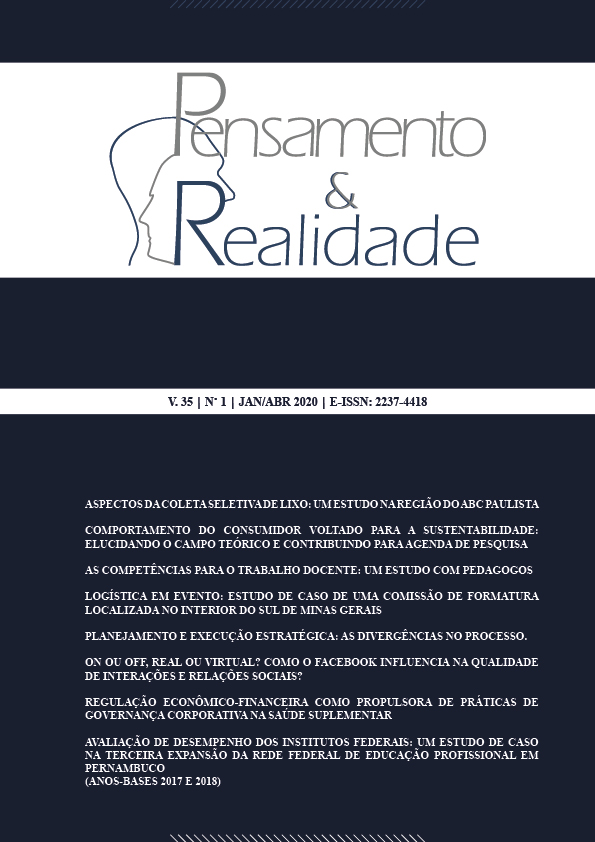On ou Off, Real ou Virtual? Como o Facebook influencia na qualidade de interações e relações sociais?
DOI:
https://doi.org/10.23925/2237-4418.2020v35i1p83-98Palavras-chave:
Facebook, Redes Sociais, Ciberpsicologia, Vida SocialResumo
As mídias sociais na internet tem um papel expressivo na vida das pessoas na era da transformação digital seja no compartilhamento de conteúdo, diversão e interações sociais. Ao mesmo tempo a dependência em casos extremos chega a gerar transtornos comportamentais como a nomofobia que é o medo irracional de ficar sem o smartphone ou ficar sem a possibilidade de usar o telefone por algum motivo, seja pela ausência de um sinal, carga da bateria ou o término do pacote de dados. Este estudo investigou determinantes para o uso (não) do Facebook e efeitos relacionados à vida social, utilizando um modelo conceitual com múltiplos construtos e variáveis. A pergunta norteadora da pesquisa é: “Como as vidas sociais das pessoas são afetadas por sua escolha de se tornar (não) usuário (do Facebook)?”. Os principais construtos do estudo quantitativo foram determinantes socioeconômicos e socioculturais, traços de personalidade, fatores comportamentais, fatores funcionais e fatores sociais.
Referências
Andreassen, C. S., Torsheim, T., Brunborg, G. S., & Pallesen, S. (2012). Development of a Facebook addiction scale. Psychological reports, 110(2), 501-517.
Błachnio, A., Przepiorka, A., & Pantic, I. (2016). Association between Facebook addiction, self-esteem and life satisfaction: A cross-sectional study. Computers in Human Behavior, 55, 701-705.
Blanton, R., & Carbajal, D. (2019). Not a Girl, Not Yet a Woman: A Critical Case Study on Social Media, Deception, and Lil Miquela. In Handbook of Research on Deception, Fake News, and Misinformation Online (pp. 87-103). IGI Global.
Blunch, N. (2012). Introduction to structural equation modeling using IBM SPSS statistics and AMOS. Sage.
Fardouly, J., & Holland, E. (2018). Social media is not real life: The effect of attaching disclaimer-type labels to idealized social media images on women’s body image and mood. New Media & Society, 20(11), 4311-4328.
Guediche, S., Blumstein, S., Fiez, J., & Holt, L. L. (2014). Speech perception under adverse conditions: insights from behavioral, computational, and neuroscience research. Frontiers in systems neuroscience, 7, 126.
Hunt, D., Atkin, D., & Krishnan, A. (2012). The influence of computer-mediated communication apprehension on motives for Facebook use. Journal of Broadcasting & Electronic Media, 56(2), 187-202.
Kittinger, R., Correia, C. J., & Irons, J. G. (2012). Relationship between Facebook use and problematic Internet use among college students. Cyberpsychology, Behavior, and Social Networking, 15(6), 324-327.
Liu, C. Y., & Yu, C. P. (2013). Can Facebook use induce well-being?. Cyberpsychology, Behavior, and Social Networking, 16(9), 674-678.
Mcandrew, F. T., & Jeong, H. S. (2012). Who does what on Facebook? Age, sex, and relationship status as predictors of Facebook use. Computers in Human Behavior, 28(6), 2359-2365.
Nadkarni, A., & Hofmann, S. G. (2012). Why do people use Facebook?. Personality and individual differences, 52(3), 243-249.
Przepiorka, A., & Blachnio, A. (2016). Time perspective in Internet and Facebook addiction. Computers in Human Behavior, 60, 13-18.
Ross, C., Orr, E. S., Sisic, M., Arseneault, J. M., Simmering, M. G., & Orr, R. R. (2009). Personality and motivations associated with Facebook use. Computers in human behavior, 25(2), 578-586.
Tang, J. H., Chen, M. C., Yang, C. Y., Chung, T. Y., & Lee, Y. A. (2016). Personality traits, interpersonal relationships, online social support, and Facebook addiction. Telematics and Informatics, 33(1), 102-108.
Uysal, R., Satici, S. A., & Akin, A. (2013). Mediating effect of Facebook® addiction on the relationship between subjective vitality and subjective happiness. Psychological reports, 113(3), 948-953.
Downloads
Publicado
Como Citar
Edição
Seção
Licença
Copyright (c) 2020 Pensamento & Realidade

Este trabalho está licenciado sob uma licença Creative Commons Attribution-NonCommercial 4.0 International License.
Os autores concedem à revista todos os direitos autorais referentes aos trabalhos publicados. Os conceitos emitidos em artigos assinados são de absoluta e exclusiva responsabilidade de seus autores.

